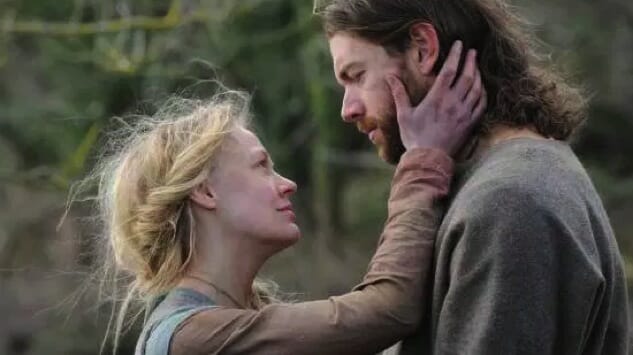The Bastard Executioner: “Broken Things/Pethau Toredig”
(Episode 1.08)

And for one episode, the cast of The Bastard Executioner set aside their petty squabbles, personal vendettas and unresolved beefs to unite for a greater purpose: hunting a rogue Frenchman. Corbett might be a murdering son of a bitch, and Wilkin might feel the utmost loathing for him, but when the newly-exiled Piers Gaveston goes on the run, both villain and hero determine to find the snide courtier and bring him to justice. If the search for Piers provided “Broken Things/Pethau Toredig” with the totality of its backbone, it might have worked out for the better. But Piers’ treachery, and his choice to go underground and hide from the law, must await resolution until next week. There are other lambs to slaughter here.
Proverbial lambs, mind, though “Broken Things/Pethau Toredig” does contain its fair share of literal slaughter. The Bastard Executioner has never tried to disguise its kinship to Game of Thrones in terms of its unflinching grittiness; they’re both intrinsically violent shows that, when occasion calls, revel in their displays of gratuitous bloodshed. But after The Bastard Executioner’s pilot, where a pregnant woman and her unborn baby were left cut to pieces for all the world to observe, the bulk of its violence, punitive or otherwise, has been visited on its male characters, with few exceptions. So if you shuddered at the sight of that poor girl losing her nose in “Effigy/Delw,” then fair warning: “Broken Things/Pethau Toredig” will probably make you blanch. That Spanish donkey ain’t no joke.
We don’t really know anything about the maidens, other than the fact that they’re twins and they don’t have any sexual boundaries. But we do know that the moment Corbett deduces they’ve been aiding Piers, they’re in for the worst reprisal imaginable; worse than that, Wilkin isn’t around the castle to punish them, so Leon and Locke step in to render his services for them. We only see the aftermath of their efforts, but the aftermath is horrible enough on its own merits, and provides a pointed reminder of exactly what kind of world The Bastard Executioner takes place in. Yet it’s the show’s restraint, such as it is, that demands attention here: Where Game of Thrones would probably show us the sisters’ suffering, “Broken Things/Pethau Toredig” has mercy enough to inflict it off-screen.
-

-

-

-

-

-

-

-

-

-

-

-

-

-

-

-

-

-

-

-

-

-

-

-

-

-

-

-

-

-

-

-

-

-

-

-

-

-

-

-








































